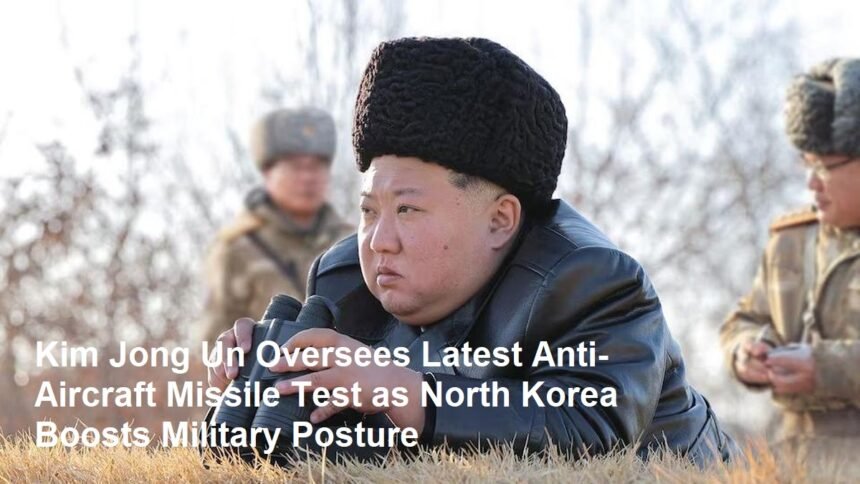North Korean leader Kim Jong Un personally supervised the test launch of a new advanced anti-aircraft missile system on Thursday, March 20, 2025, state media reported, in a move analysts describe as a calculated show of military strength amid stalled denuclearization talks and rising regional tensions. The test, conducted along the country’s eastern coast, underscores Pyongyang’s continued focus on modernizing its arsenal despite international sanctions and pressure.
Show of Strength Amid Tensions
According to the Korean Central News Agency (KCNA), Kim Jong Un observed the launch of the “cutting-edge” surface-to-air missile system, dubbed the KN-XX, which state media claimed is capable of intercepting stealth aircraft and high-altitude targets at ranges exceeding 150 kilometers. The test reportedly simulated a defense scenario against “hostile aerial incursions,” with Kim emphasizing the need to “bolster self-reliance in safeguarding national sovereignty” against perceived U.S. and South Korean threats.
The launch comes days after U.S.-South Korea joint military drills resumed near the Korean Demilitarized Zone (DMZ), which Pyongyang condemned as rehearsals for invasion. Analysts suggest the timing aims to signal North Korea’s readiness to counter advanced aerial assets, including U.S. F-35 fighters and surveillance drones deployed in the region.
Technical Specifications and Strategic Goals
South Korea’s Defense Ministry confirmed detecting the missile launch, noting its trajectory and speed aligned with previous tests of North Korea’s medium-range anti-aircraft systems. However, Seoul cast doubt on Pyongyang’s claims of “unprecedented precision,” citing inconsistencies in state media footage. The KN-XX system appears to incorporate radar-evading materials and improved targeting software, though independent verification remains challenging due to limited access to North Korean military data.
Military experts warn the system could complicate allied air operations in a conflict. “If operational, this technology poses a significant risk to reconnaissance missions and low-altitude strikes,” said Choi Kang, vice president of the Seoul-based Asan Institute for Policy Studies.
Regional Reactions
The test drew swift condemnation from South Korea and Japan. South Korea’s Unification Ministry called it a “provocative act undermining regional stability,” while Japanese Prime Minister Fumio Kishida urged Pyongyang to “prioritize dialogue over escalation.” The U.S. State Department reiterated calls for North Korea to return to denuclearization negotiations, stalled since 2019, but refrained from detailing potential countermeasures.
China, North Korea’s primary ally, urged restraint on all sides, with Foreign Ministry spokesperson Wang Wenbin stating, “Parties should avoid actions that heighten confrontation.” Meanwhile, Russia, which has deepened military ties with Pyongyang since 2022, remained silent on the launch.
International Condemnation and Sanctions
The United Nations Security Council is expected to convene an emergency session to discuss the test, though analysts predict limited progress due to veto powers held by Russia and China. North Korea remains under heavy UN sanctions for its nuclear and ballistic missile programs, but Pyongyang has increasingly relied on clandestine networks to procure components for its weapons programs.
“Sanctions alone won’t halt Kim’s ambitions. This test proves North Korea’s ability to innovate under pressure,” said Leif-Eric Easley, a professor at Ewha University in Seoul.
Domestic Propaganda Victory
State media portrayed the test as a milestone in Kim Jong Un’s push for military self-sufficiency. Broadcasts showed Kim applauding engineers and vowing to “equip the Korean People’s Army with invincible defensive capabilities.” The event coincided with domestic campaigns celebrating the 10th anniversary of Kim’s declaration of North Korea as a “nuclear state,” reinforcing his image as a protector against foreign aggression.
Diplomatic Stalemate
The missile test further complicates efforts to revive diplomacy. While the Biden administration has expressed openness to unconditional talks, North Korea continues to reject overtures, demanding sanctions relief and security guarantees first. South Korean President Yoon Suk Yeol, facing domestic pressure over his hardline stance, warned of “overwhelming responses” to provocations but left the door open for engagement.
As tensions simmer, the test highlights Pyongyang’s dual strategy: advancing military capabilities while leveraging brinkmanship to extract concessions. With no breakthroughs in sight, the Korean Peninsula remains a flashpoint in global security.












